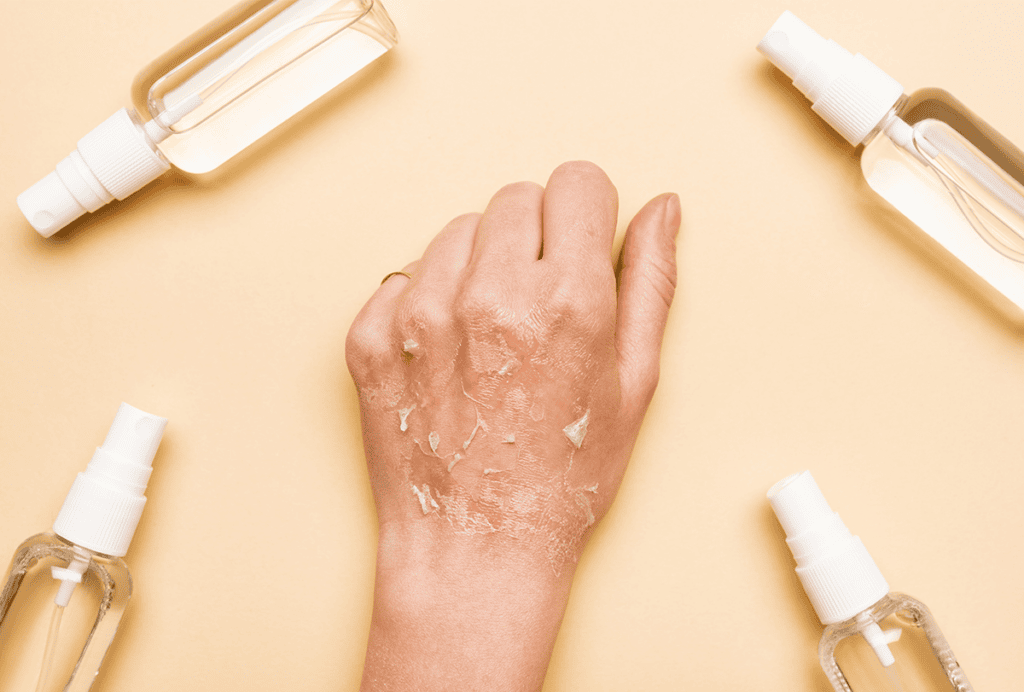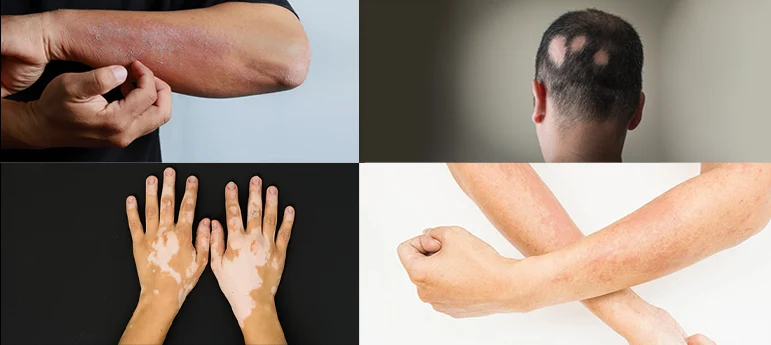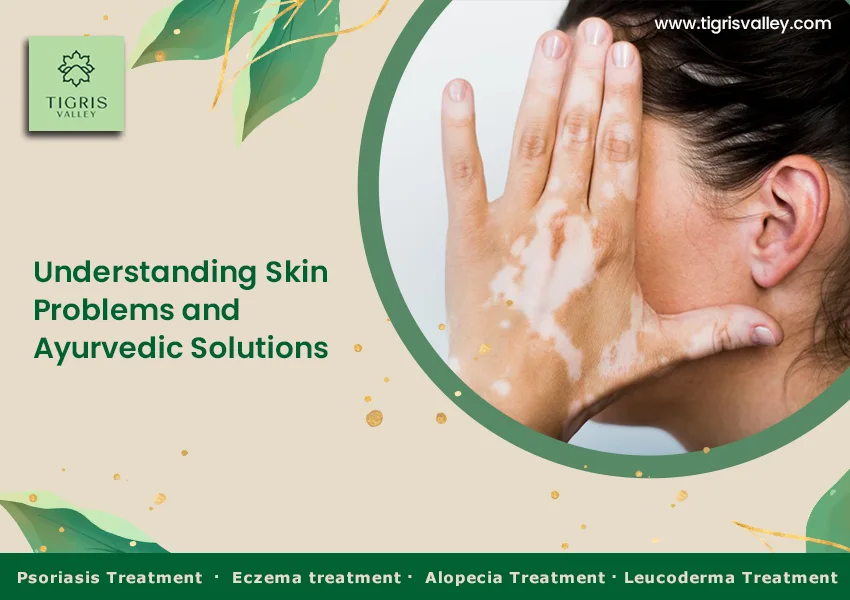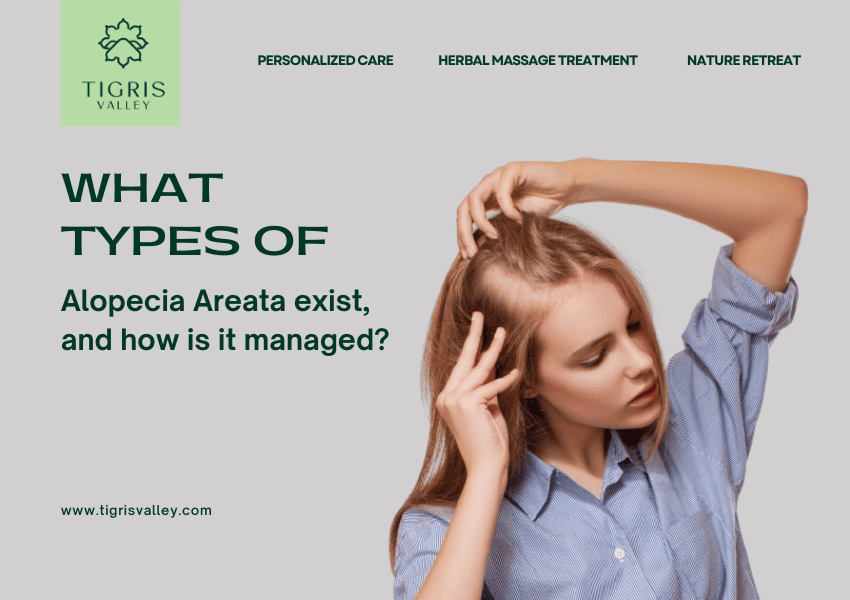Understanding Skin Problems and Ayurvedic Solutions
Skin problems can be quite distressing, affecting both physical comfort and self-esteem. These issues manifest in various ways, from irritation and redness to chronic conditions like acne, psoriasis, eczema, and leucoderma. Understanding the symptoms and root causes of these skin disorders is crucial for effective management and treatment. At Tigris Valley, Wellness hospital in Kerala we understand the complexity of skin problems and offer comprehensive treatment options for various skin diseases. Our approach is rooted in Ayurvedic principles, focusing on addressing the underlying causes while providing holistic care for skin health.
Symptoms of Skin Problems:
Skin conditions present a wide array of symptoms, including:
– Burning
– Swelling
– Redness
– Itching
– Pain
– Itchy or painful infections
Root Causes of Skin Disorders:
1. Toxic Accumulation: The body may accumulate toxic materials (ama) as a result of poor digestion, inadequate excretion, unhealthful diet, and lifestyle decisions. This may show up as skin irritation, infections, or long-term illnesses.
2. Stress: The state of mind and emotions has a big influence on general health, which includes skin health. Stress can worsen skin sensitivity and cause problems like acne, especially when associated with grievances and regrets.
3. Unhealthy Diet: A nourishing diet is necessary for good skin and general well-being. Improper food combinations and unhealthy eating habits can lead to metabolic residues and toxic buildup in the body, affecting the skin.
4. Dry or Oily Skin: Skin type plays a role in susceptibility to skin diseases. Dry skin requires adequate internal and external lubrication, while oily skin needs careful management to prevent issues.
5. Constipation: Regular elimination of waste is crucial for skin health. Constipation can lead to toxin buildup, emphasizing the importance of hydration and a fiber-rich diet.

Common Types of Skin Diseases:
– Alopecia
– Psoriasis
– Eczema
– Leucoderma
Ayurvedic Approach to Skin Disease Management by Tigris Valley
Ayurveda offers holistic solutions for managing skin diseases by addressing root causes and promoting overall well-being. Here are some Ayurvedic therapies used for skin diseases treatment:
1. Steaming: Clears blockages in subtle channels (Srothas) but not recommended during inflammations.
2. Vamana: Induces vomiting to remove blockages in Srothas, beneficial for facial and body skin.
3. Virechana: Medicated purgation to reduce vitiated Pitta and Rakta (blood dhatu), suitable for inflammatory stages.
4. Nasya: Administering herbs and medicines through the nose, effective for chronic acne.
5. Snehana: Taking medicinal ghee orally; this is helpful for psoriasis that is influenced by Vata.
6. Basti: Medicated enemas followed by consuming medicated ghee, aids in detoxification.
7. Detoxification: Panchakarma treatment in Kerala treatments like Virechana and Vamana, are effective for psoriasis treatment.
8. External Treatments: Includes Lepa (herbal paste), Parisheka (pouring warm oils and decoctions), Udvarthana (rubbing with herbal powders), and Dhupana (fumigation with herbs).
Leucoderma Treatment
Leucoderma, characterized by white patches on the skin due to melanin loss, can be effectively treated through Ayurveda. Ayurvedic therapies focus on balancing doshas, detoxifying the body, and promoting melanin production. Leucoderma treatment like Virechana (medicated purgation) and Basti (medicated enemas) help in cleansing toxins, while Nasya (nasal administration of herbs) and Lepa (herbal paste application) stimulate melanin synthesis. Ayurvedic formulations containing herbs like Bakuchi, Khadira, and Manjishtha are beneficial for leucoderma treatment in Ayurveda.
Psoriasis Permanent Treatment in Ayurveda:
Psoriasis, a chronic autoimmune condition causing red, scaly patches on the skin, can find long-lasting relief through Ayurveda. Ayurvedic treatments focus on pacifying aggravated doshas, especially Pitta and Kapha, through therapies like Vamana (therapeutic vomiting) and Virechana (purgation). External treatments like Lepa (herbal paste application) with Neem, Turmeric, and Aloe Vera help soothe inflammation and promote skin healing. Ayurvedic herbs like Guggulu, Haridra, and Manjishtha are also beneficial for managing Ayurvedic psoriasis treatment in Kerala.

Eczema Treatment in Ayurveda:
Eczema, characterized by itchy, inflamed skin, can be effectively managed with Ayurvedic principles. Balancing aggravated doshas, particularly Vata and Kapha, is essential in ayurvedic treatment for eczema in Kerala. Ayurvedic therapies like Abhyanga (oil massage), Swedana (herbal steam therapy), and Nasya (nasal administration of oils) help in soothing skin inflammation and improving skin texture. Internal herbs like Triphala, Guduchi, and Kutki are beneficial for detoxification and immune support, aiding in eczema management.
Alopecia areata treatment in Kerala
Alopecia, characterized by hair loss, can benefit from Ayurvedic approaches focusing on dosha balance, scalp health, and hair nourishment. Ayurvedic treatments like Shiro Abhyanga (head massage), Shirodhara (oil pouring on the forehead), and Nasya (nasal administration of oils) help promote hair growth and scalp health. Internal herbs like Bhringraj, Brahmi, and Amla nourish hair follicles and support healthy hair growth. Additionally, lifestyle modifications including stress management and a balanced diet are crucial for holistic alopecia treatment.
Lifestyle Changes and Dietary Recommendations:
Ayurveda emphasizes holistic lifestyle changes and dietary modifications for skin health, including:
– Making proper food choices and eating mindfully
– Hydrating adequately
– Incorporating herbal remedies and supplements
– Practicing yoga, meditation, and stress management techniques
– Following a skincare routine using natural products
Skin problems are complex and require a comprehensive approach that addresses both symptoms and root causes. Ayurveda offers a time-tested methodology focusing on internal balance, detoxification therapy and holistic well-being to manage and treat various skin diseases effectively. By integrating Ayurvedic therapies, lifestyle changes, and dietary adjustments, individuals can achieve lasting improvements in skin health and overall quality of life.



